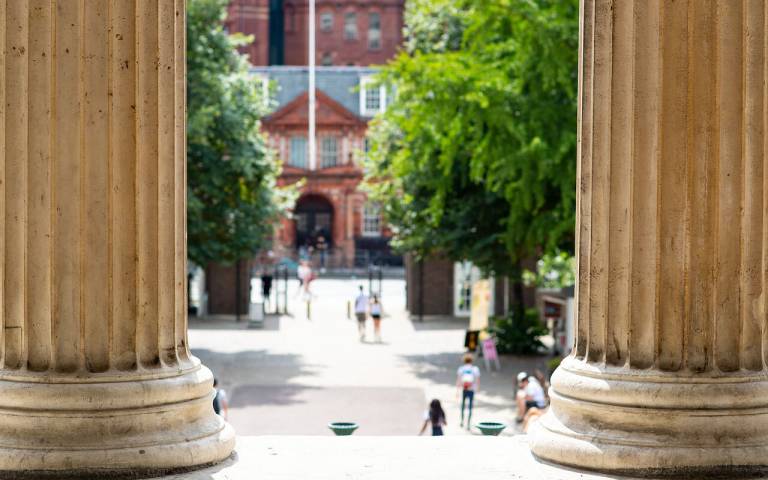Opinion: How behavioural science can disentangle research culture
26 March 2024
Emma Todd, Director of Research Culture at UCL, and Dr Fabiana Lorencatto, co-director of UCL's Centre for Behaviour Change, explore how behavioural science can help bring about changes to research culture.

Describing and measuring something as complex and multifaceted as organisational culture is tricky. So it’s no surprise that, while there’s broad consensus about research culture’s importance to universities’ academic and societal missions, the practicalities of defining and measuring it, not to mention changing it, are proving harder to pin down.
UK Research and Innovation’s current consultation on research culture indicators, and its forthcoming pilot of the People, Culture and Environment element of the Research Excellence Framework will seek to answer some of the bigger questions. But institutions will still face many issues and options beyond its scope.
In the meantime, many universities are using the Royal Society’s definition of research culture, as something that encompasses “behaviours, values, expectations, attitudes and norms” and “influences researchers’ career paths and determines the way that research is conducted and communicated”, as a handrail for developing their plans.
Even this presents some immediate challenges. Much of research culture is implicit, operating beneath the surface. Values, expectations and attitudes are reflected in subtle cues, unwritten rules and social dynamics. Culture includes communication styles, decision-making processes, reward systems and employee interactions.
Capturing all these dimensions may require multiple assessment tools and methods. Added to this, every university contains many subcultures across disciplines, departments and even research groups. These dimensions of culture likely interconnect, influence and reinforce one another.
Fundamentally, though, organisations are made up of individuals. Improving research culture will require someone, somewhere, to do something differently. It will, in other words, require behaviour change.
That’s why UCL’s research culture team is working with its Centre for Behaviour Change to use the behavioural sciences to help disentangle some of this complexity. These disciplines study the cognitive, social and environmental influences on human behaviour, and offer theories, models and methods for designing and evaluating interventions aimed at changing it.
Research culture emerges from many behaviours by many different actors, including students, researchers, professional services and funders. It depends on how they communicate, collaborate, lead and manage. It expresses itself, and is shaped by, interdisciplinary work, open science practices, and levels of support and inclusivity.
We need to define research culture in terms of these underlying behaviours. Then theories and models from behavioural science can help us understand why people do or do not engage in these behaviours.
To do this, we are using a framework called the Behaviour Change Wheel. This starts by defining the problem —in this case a poor research culture— in behavioural terms. This means using behavioural science to flesh out the Royal Society’s definition, identifying expectations, attitudes and norms, and whose and which behaviours contribute to research culture.
One simple but comprehensive model, known as COM-B, posits that for someone to act in a certain way, they must have the capability, opportunity and motivation to do so. This includes values, attitudes, norms, and expectations, but also broader factors such as emotions, habits, time, resources, opportunities, knowledge, and skills. Behavioural science can explore how each of these factors enable or deter behaviours linked to research culture.
From here, we can design interventions to target key actors and influences on behaviours contributing to research culture. Who needs to do what differently, where and when?
This more systematic approach leads to interventions that are more likely to tackle underlying issues and improve behaviour. It also helps to prioritise effort and get the best return on investment. And importantly, in a world that values what it can measure, behavioural science gives more tangible ways to measure progress, learn from success and failure, and support replication and scalability.
Similar approaches have proved successful in many other areas, such as helping to reducing use of antibiotics and improve disposal of plastic waste. Their potential in supporting universities to improve their research culture has yet to be fully explored.
It's often said that 70 per cent of organisational change initiatives fail. For something as complex as culture change, the figure is probably higher. Exploring how behavioural science can help bring about meaningful and sustained change can improve those odds.
Over the next two years, the Centre for Behaviour Change and the Research Culture team will build on previous collaborations to develop behavioural indicators for UCL’s institutional Research Culture Roadmap, explore what shapes behaviour, and design and trial behaviour-change strategies. It won’t be a silver bullet, but we hope to reduce some of the complexity.
More information
- A version of this article was published in Research Fortnight (£)
- Emma Todd
- Dr Fabiana Lorencatto
- UCL Centre for Behaviour Change
 Close
Close

